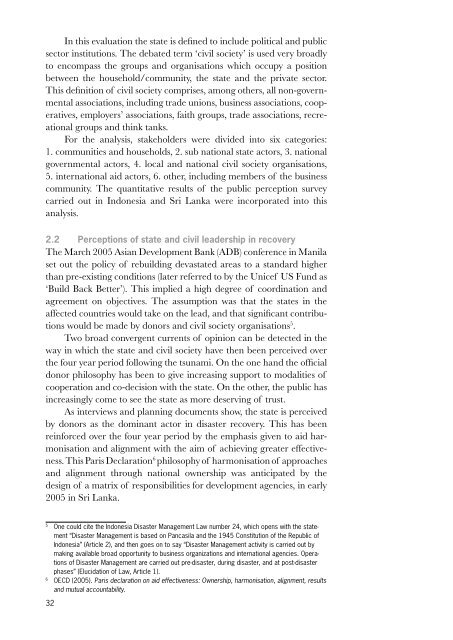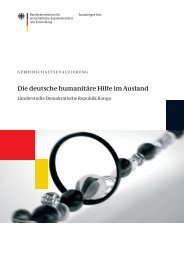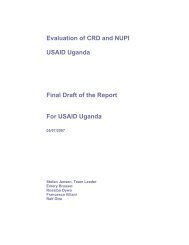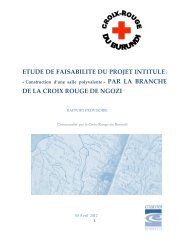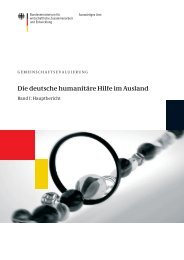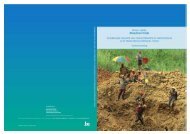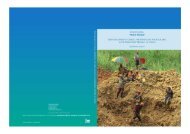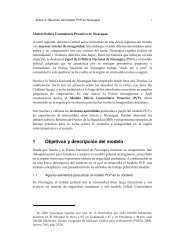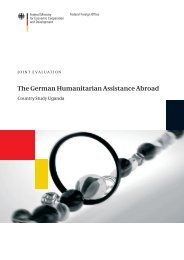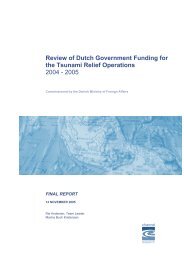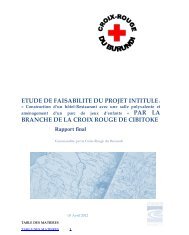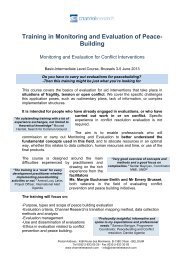A ripple in development? - Channel Research
A ripple in development? - Channel Research
A ripple in development? - Channel Research
You also want an ePaper? Increase the reach of your titles
YUMPU automatically turns print PDFs into web optimized ePapers that Google loves.
In this evaluation the state is def<strong>in</strong>ed to <strong>in</strong>clude political and public<br />
sector <strong>in</strong>stitutions. The debated term ‘civil society’ is used very broadly<br />
to encompass the groups and organisations which occupy a position<br />
between the household/community, the state and the private sector.<br />
This def<strong>in</strong>ition of civil society comprises, among others, all non-governmental<br />
associations, <strong>in</strong>clud<strong>in</strong>g trade unions, bus<strong>in</strong>ess associations, cooperatives,<br />
employers’ associations, faith groups, trade associations, recreational<br />
groups and th<strong>in</strong>k tanks.<br />
For the analysis, stakeholders were divided <strong>in</strong>to six categories:<br />
1. communities and households, 2. sub national state actors, 3. national<br />
governmental actors, 4. local and national civil society organisations,<br />
5. <strong>in</strong>ternational aid actors, 6. other, <strong>in</strong>clud<strong>in</strong>g members of the bus<strong>in</strong>ess<br />
community. The quantitative results of the public perception survey<br />
carried out <strong>in</strong> Indonesia and Sri Lanka were <strong>in</strong>corporated <strong>in</strong>to this<br />
analysis.<br />
2.2 Perceptions of state and civil leadership <strong>in</strong> recovery<br />
The March 2005 Asian Development Bank (ADB) conference <strong>in</strong> Manila<br />
set out the policy of rebuild<strong>in</strong>g devastated areas to a standard higher<br />
than pre-exist<strong>in</strong>g conditions (later referred to by the Unicef US Fund as<br />
‘Build Back Better’). This implied a high degree of coord<strong>in</strong>ation and<br />
agreement on objectives. The assumption was that the states <strong>in</strong> the<br />
affected countries would take on the lead, and that significant contributions<br />
would be made by donors and civil society organisations 5 .<br />
Two broad convergent currents of op<strong>in</strong>ion can be detected <strong>in</strong> the<br />
way <strong>in</strong> which the state and civil society have then been perceived over<br />
the four year period follow<strong>in</strong>g the tsunami. On the one hand the official<br />
donor philosophy has been to give <strong>in</strong>creas<strong>in</strong>g support to modalities of<br />
cooperation and co-decision with the state. On the other, the public has<br />
<strong>in</strong>creas<strong>in</strong>gly come to see the state as more deserv<strong>in</strong>g of trust.<br />
As <strong>in</strong>terviews and plann<strong>in</strong>g documents show, the state is perceived<br />
by donors as the dom<strong>in</strong>ant actor <strong>in</strong> disaster recovery. This has been<br />
re<strong>in</strong>forced over the four year period by the emphasis given to aid harmonisation<br />
and alignment with the aim of achiev<strong>in</strong>g greater effectiveness.<br />
This Paris Declaration 6 philosophy of harmonisation of approaches<br />
and alignment through national ownership was anticipated by the<br />
design of a matrix of responsibilities for <strong>development</strong> agencies, <strong>in</strong> early<br />
2005 <strong>in</strong> Sri Lanka.<br />
5<br />
One could cite the Indonesia Disaster Management Law number 24, which opens with the statement<br />
“Disaster Management is based on Pancasila and the 1945 Constitution of the Republic of<br />
Indonesia” (Article 2), and then goes on to say “Disaster Management activity is carried out by<br />
mak<strong>in</strong>g available broad opportunity to bus<strong>in</strong>ess organizations and <strong>in</strong>ternational agencies. Operations<br />
of Disaster Management are carried out pre-disaster, dur<strong>in</strong>g disaster, and at post-disaster<br />
phases” (Elucidation of Law, Article 1).<br />
6<br />
OECD (2005). Paris declaration on aid effectiveness: Ownership, harmonisation, alignment, results<br />
and mutual accountability.<br />
32


